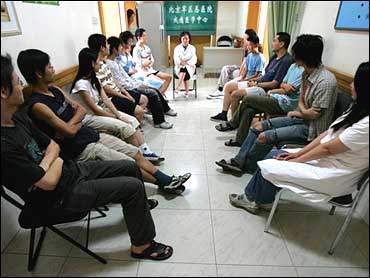|
Morals lost online as kids make hackers idols
(Shanghai Daily)
Updated: 2005-12-12 09:17 Computer hackers have become
the idols of Shanghai primary school students - causing educators alarm
about the moral education system.

A new group of Internet addicts
are interviewed by nurses at the Beijing Military Region Central Hospital,
a clinic geared toward curing Internet addicts.
[AP] |
Shanghai Academy of Social
Sciences' youth research institute asked nearly 5,000 primary students about
their Internet use and preferences. Nearly 43 percent said they adore computer
hackers.
About 33 percent said they dream of being a hacker themselves.
"Hackers are very cool," said 8-year-old Fan Yi, a local primary schoolboy.
He said hackers leave people an impression of high intelligence and are able
to do whatever they like and get whatever secrets they want.
"That is what I lack but dream of," Fan said.
The survey found more than 31 percent of students consider surfing the
Internet to be one of their major hobbies.
Children spend one hour to three hours a day on the Net.
Nearly 80 percent are exposed to sex-related documents or pictures that are
unsuitable for their age.
All youngsters who log onto the Internet at public Net bars were found to
access sex-related Web contents, the survey said.
Yang Xiong, researcher and the institute director, said hacker adoration and
Internet reliance are all hidden dangers for youngsters' healthy moral
development.
"Children are educated to contribute more than take from others, but they
often find that information they receive from modern entertainment and real
society doesn't comply with what teachers preach at school," Yang said. "That
confuses young students."
Students are forced to follow the teachers at school, but they need to have a
method or a place, such as submerging in cyberspace or dreaming of being a
hacker, to let out their repressed real thoughts, Yang said.
Wu Zunmin, an education professor at East China Normal University, said the
only solution to the hidden problem is to change the monotonous and futile
school moral education system.
"Adults should also pay attention to their daily behavior to set good moral
examples for children," Wu said.
|